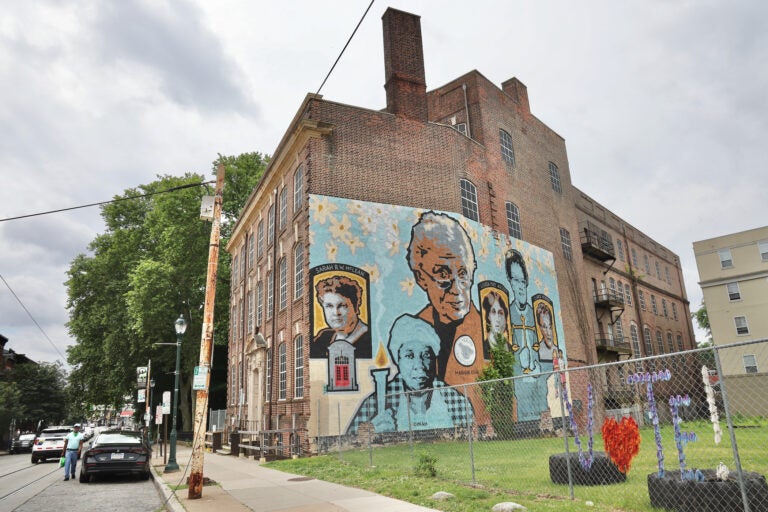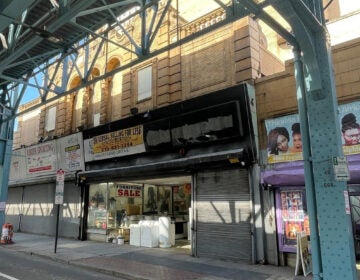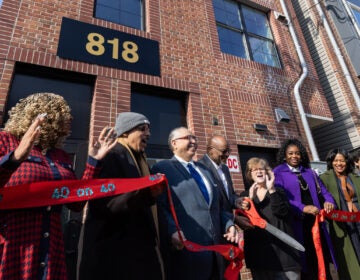Philly judge rejects developer’s bid to become conservator of Germantown YWCA
Neighbors have long bemoaned the building as an eyesore and have repeatedly called on the city to restore the historic property before it’s too late.

The former Germantown YWCA stands adjacent to Vernon Park in Phiiladelphia's Germantown neighborhood. (Emma Lee/WHYY)
Have a question about Philly’s neighborhoods or the systems that shape them? PlanPhilly reporters want to hear from you! Ask us a question or send us a story idea you think we should cover.
A Philadelphia judge has dismissed real estate developer Ken Weinstein’s petition to take control of the former Germantown YWCA, a crumbling city-owned building that has sat vacant since closing more than two decades ago.
The one-page ruling, issued Friday by Common Pleas Court Judge Ann Butchart, states that Weinstein “failed to establish” that the historic building was blighted and abandoned under Act 135. The state law provides a mechanism for neighbors, nonprofits and municipalities to revitalize such properties in their communities, with the goal of putting them into productive use.
If a judge deems a building blighted and abandoned under the measure, the property can be awarded to a conservator, a designation that enables it to be sold to a new developer.
“Needless to say, the Court’s decision is disappointing to me and the greater Germantown community. Residents have been working hard to make their community a better place to live, work and enjoy. By leaving a key property, in the middle of Germantown, vacant and deteriorated for 20 plus years, PRA has done a disservice to the people of Germantown,” Weinstein said in a statement.
A city spokesperson did not immediately respond to a request for comment.
Butchart’s decision follows a three-part evidentiary hearing that pitted Weinstein against the city, which argued it has been a diligent steward of the Germantown Y, which is listed on the city’s register of historic places.
For more than a century, it was a beloved community anchor on Germantown Avenue. The social service agency, the first to integrate in Philadelphia, hosted clubs and classes and at one point served as a vital hub for civil rights.
“Our interest was always to preserve that building,” testified David Thomas, chairperson for the Philadelphia Redevelopment Authority, which owns the property.
The PRA seized the Y in 2013 after its previous owner, Germantown Settlement, failed to repay a $1.3 million loan the authority awarded the nonprofit to turn the building into a community center.
Settlement, which wielded tremendous power with the help of political allies, was insolvent when the city issued the loan and later filed for bankruptcy over the financial mismanagement of millions in taxpayer dollars.
In court, Weinstein argued the city had allowed the Y to deteriorate all these years, and that the building had become a dangerous eyesore as a result, requiring immediate intervention to prevent someone from getting hurt.
Sam Olshin, a veteran architect, testified the property is in “dire” need of restoration. He pointed to loose bricks and signs of water damage, as well as crumbling back steps and a retaining wall on the verge of collapse — signs he said showed that the Y had not been properly cared for in at least a decade.
“There is a lot on this building that has been neglected,” said Olshin, the principal at Atkins Olshin Schade Architects, a firm specializing in preservation and adaptive reuse projects.
Thomas acknowledged the Y was in poor shape when the city seized it from Settlement, but he argued the PRA had taken steps to ensure the condition of the neighborhood landmark did not decline to a point that it needed to be demolished. Those steps included spending $1.5 million to stabilize and secure the building.
Since 2016, city maintenance crews have visited the property at least once a month, Thomas said. After the first part of the evidentiary hearing in March, he authorized crews to go to the Y to remove debris, put up additional fencing and post “no trespassing signs.”
“There’s been significant development over there, which is why we want to see this property developed,” Thomas said in court.
In 2016, the PRA selected KBK Enterprises to revamp the Y. The company is still working to secure funding for its $18 million plan to transform the property into a mixed-use development, a source of deep frustration for many residents who desperately want to see the property put back into use.
Weinstein, who has developed several historic properties in the neighborhood, did not file the petition with hopes of taking over for KBK. He has maintained that he wanted to become a conservator in order to make repairs and potentially sell the building to a new developer, possibly for an affordable housing project.
Weinstein’s petition was not supported by City Councilmember Cindy Bass, whose district includes the Y.
Bass did not immediately respond to a request for comment. She has said it was “disappointing that Ken Weinstein decided not to support this project,” referring to KBK’s proposal.
In his statement, Weinstein said he will ask Judge Butchart to “reconsider” her decision. If she rejects the request, the developer can appeal the decision to a higher court.
“Based on Act 135’s definition of blight, we clearly established that blight existed at the historic YWCA as of the date of filing and that the majority of the blight continues to exist at this property today,” Weinstein said.

Subscribe to PlanPhilly
WHYY is your source for fact-based, in-depth journalism and information. As a nonprofit organization, we rely on financial support from readers like you. Please give today.








